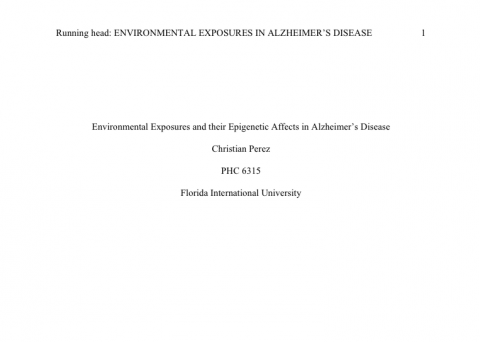Research Article On Alzheimer's Disease
- Recent Research Articles On Alzheimer's Disease Pdf
- Scholarly Articles On Alzheimer's Disease
- Alzheimer's Disease Articles Pdf
Recent Alzheimer's & Dementia Articles. Generation of a human induced pluripotent stem cell–based model for tauopathies combining three microtubule-associated protein tau mutations which displays several phenotypes linked to neurodegeneration. For the last two decades, the focus of most Alzheimer’s research has been on a disease model called “the amyloid hypothesis,” which begins with the “amyloid beta” precursor protein (APP.
- Date:
- June 12, 2019
- Source:
- University of South Florida (USF Innovation)
- Summary:
- Apolipoproten E (apoeE) is a major genetic risk factor for the development of Alzheimer's disease, yet it tends to be understudied as a potential druggable target for the mind-robbing neurodegenerative disease. Now a research team reports that a novel apoE antagonist blocks apoE interaction with N-terminal amyloid precursor protein (APP) and reduces hallmark Alzheimer's-associated pathologies.
- Share:
Apolipoproten E (apoeE) is a major genetic risk factor for the development of Alzheimer's disease, yet the protein tends to be understudied as a potential druggable target for the mind-robbing neurodegenerative disease.
Now a research team led by the University of South Florida Health (USF Health) Morsani College of Medicine reports that a novel apoE antagonist blocks apoE interaction with N-terminal amyloid precursor protein (APP). Moreover, this peptide antagonist, known as 6KApoEp, was shown to reduce Alzheimer's-associated beta amyloid (β-amyloid) accumulation and tau pathologies in the brain, as well as improving learning and memory in mice genetically engineered to mimic symptoms of Alzheimer's disease.
Recent Research Articles On Alzheimer's Disease Pdf
Many failed anti-amyloid therapies for Alzheimer's disease have been directed against various forms of the protein β-amyloid, which ultimately forms clumps of sticky plaques in the brain. The presence of these amyloid plaques is one of the major hallmarks of Alzheimer's disease.
The USF Health research findings suggests that disrupting apoE physical interaction with N-terminal APP may be a new disease-modifying therapeutic strategy for this most common type of dementia.
The preclinical study was published online May 2 in Biological Psychiatry.
'For the first time, we have direct evidence that the N-terminal section of apoE itself acts as an essential molecule (ligand) to promote the binding of apoeE to the N-terminal region of APP outside the nerve cell,' said the study's lead author Darrell Sawmiller, PhD, an assistant professor in the USF Health Department of Psychiatry & Behavioral Neurosciences. 'This receptor-mediated mechanism plays a role in the development of Alzheimer's disease. Overstimulation of APP by apoE may be an earlier, upstream event that signals other neurodegenerative processes contributing to the amyloid cascade.'
'Initially we wanted to better understand how apoE pathologically interacts with APP, which leads to the formation of β-amyloid plaques and neuronal loss,' said study senior author Jun Tan, PhD, MD, a professor in the USF Health Department of Psychiatry & Behavioral Neurosciences. 'Our work further discovered an apoE derivative that can modulate structural and functional neuropathology in Alzheimer's disease mouse models.'

Story Source:
#10434 - Used 2002 Delta 3HGN 3 Horse Trailer with 4' Short Wall. #30456 - Used 2000 Featherlite 7404GN 4 Horse Trailer with 5' Short Wall. View nationwide listing of new and used horse trailers. ON SALE NOW NEW ELITE 4 HORSE REVERSE LOAD 16'8' LQ SLIDE OUT - COUCH AND WRAP. Used 4 horse trailers for sale in texas.
Materials provided by University of South Florida (USF Innovation). Note: Content may be edited for style and length.
Scholarly Articles On Alzheimer's Disease
Journal Reference:
- Darrell Sawmiller, Ahsan Habib, Huayan Hou, Takashi Mori, Anran Fan, Jun Tian, Jin Zeng, Brian Giunta, Paul R. Sanberg, Mark P. Mattson, Jun Tan. A Novel Apolipoprotein E Antagonist Functionally Blocks Apolipoprotein E Interaction With N-terminal Amyloid Precursor Protein, Reduces β-Amyloid-Associated Pathology, and Improves Cognition. Biological Psychiatry, 2019; DOI: 10.1016/j.biopsych.2019.04.026
Cite This Page:
- RELATED TERMS
- Alzheimer's disease
- Dementia with Lewy bodies
- Personalized medicine
- Excitotoxicity and cell damage
- Bovine spongiform encephalopathy
- Urinary incontinence
- Parkinson's disease
- Amyloid

Antibody Removes Alzheimer's Plaques, in Mice
